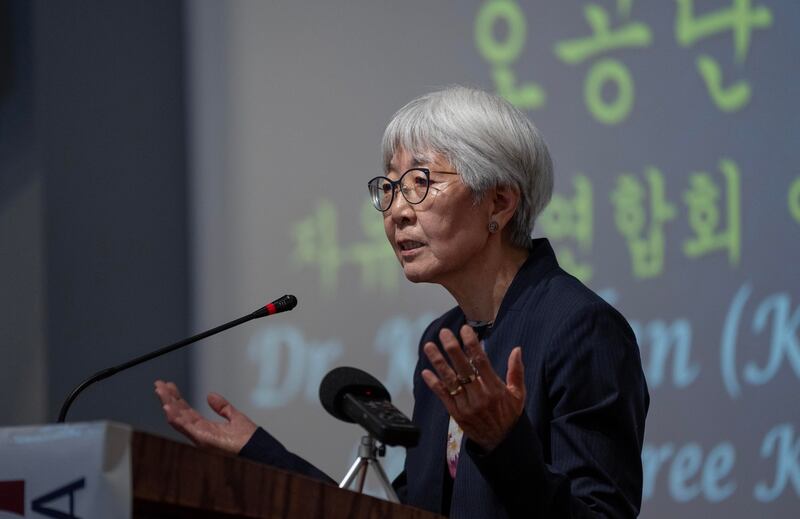Six in 10 South Koreans believe that people who have escaped North Korea should not be called "talbuk-min" or "talju-min" in Korean – terms which are often translated into English as "defector" – a survey by a Seoul-based government think tank revealed.
The Korea Institute for National Unification, or KINU, asked 505 North Korean escapees who settled in South Korea and 500 other South Korean citizens their opinions of both monikers. Of these, 59% of respondents said that it was necessary to change the official terminology for North Korean escapees, 29% said no change was necessary, and 12% said they were not sure.
KINU revealed the results during its Unification Policy Forum, an event it hosted two days before the very first Defectors’ Day, a new holiday declared by the South Korean government that will be celebrated every July 14.
Of those who said it was necessary to change the terms, 61% said it was because they have a negative connotation, 19% said it was because the terms cast South Korea-based families of escapees negatively, and 15% said the terms do not take into account the opinions of escapees.
Since the end of hostilities in the Korean War in 1953, more than 34,000 North Koreans have escaped the North to resettle in the South, according to statistics from the South Korean Ministry of Unification. Many more escapees live in China, and must hide from authorities because of the threat of forced repatriation.

What’s in a word?
The debate on how to describe people who have escaped from North Korea extends beyond the Korean language.
Rights organizations often use the term “refugee” because they believe that it more accurately describes the reasons they flee, and it promotes the idea that China has a responsibility to protect North Korean escapees in its territory because they could face persecution if they are made to return.
Beijing, however, says they are economic migrants who have illegally entered the country, not refugees, and are therefore not entitled to protection under international law.
RELATED STORIES
[ At UN, North Koreans beg China to stop sending escapees backOpens in new window ]
[ US discusses North Korea with China, raises repatriation concernsOpens in new window ]
[ Escaped North Koreans urge China to stop the ‘genocide’ of forced repatriation Opens in new window ]
The South Korean government often translates the official terms as “defector” in English, and many – if not most – international media outlets use this term.
Radio Free Asia refers only to those who were members of the government or the military at the time of their escape as defectors, opting for the more neutral term “escapee” in all other cases.
Alternatives
At a policy symposium on July 10, South Korea's Presidential Committee of National Cohesion proposed using new terminology such as "buk-baegyeong-jumin," meaning "residents with a northern background;" or "talbuk-gukmin," which could be translated as "defector citizens."
According to KINU's survey, of the respondents who said that the official terms need to change, 28% said they preferred the term "hana-min" which could be loosely translated as "people from the one, singular Korea."

Meanwhile 26% said they preferred "tongil-min," meaning "unified people;" 24% liked "bukhyang-min," or "people with a hometown in the north;" 9% liked "buk-iju-min" or "northern immigrants;" and 4% liked "buk-baegyeong-jumin," the term proposed by the presidential committee, which means they have a northern background.
About 9% said they preferred something other than those terms.
Because there is no consensus, keeping the existing terms makes the most sense, Lee Kyu-chang, the director of KINU’s Human Rights Research Division said at the Unification Policy Forum on Friday.
He said though that if the official terminology must be changed, he preferred the "talbuk-gukmin" or "defector citizens" because it acknowledges that these people are citizens of South Korea, with the same rights as every other citizen.

South Korea claims to be the sole legitimate government on the Korean peninsula, and its official policy is that all North Koreans are its citizens.
North Korea held the same view officially until late last year, when it declared that North and South Koreans are not the same people living in the same country, but instead are citizens of two hostile nations.
“This is why we need to continue to send the message that we are the same country and the same race of people,” said Lee.
Of the alternative terms, "buk-baegyeong-jumin," the term that means "residents with a northern background," is problematic because it suggests that the escapees are in the same lot as immigrants, Hyun In-ae, the director of the Seoul-based Korean Peninsula Future Women's Research Institute, told RFA Korean.
“[North Korean leader] Kim Jong Un said that South and North Koreans are a different race of people,” she said. “If we regard North Korean escapees as ‘immigrants,’ we essentially are agreeing with the North Korean regime’s opinion.”
Translated by Claire S. Lee and Leejin J. Chung. Edited by Eugene Whong.









